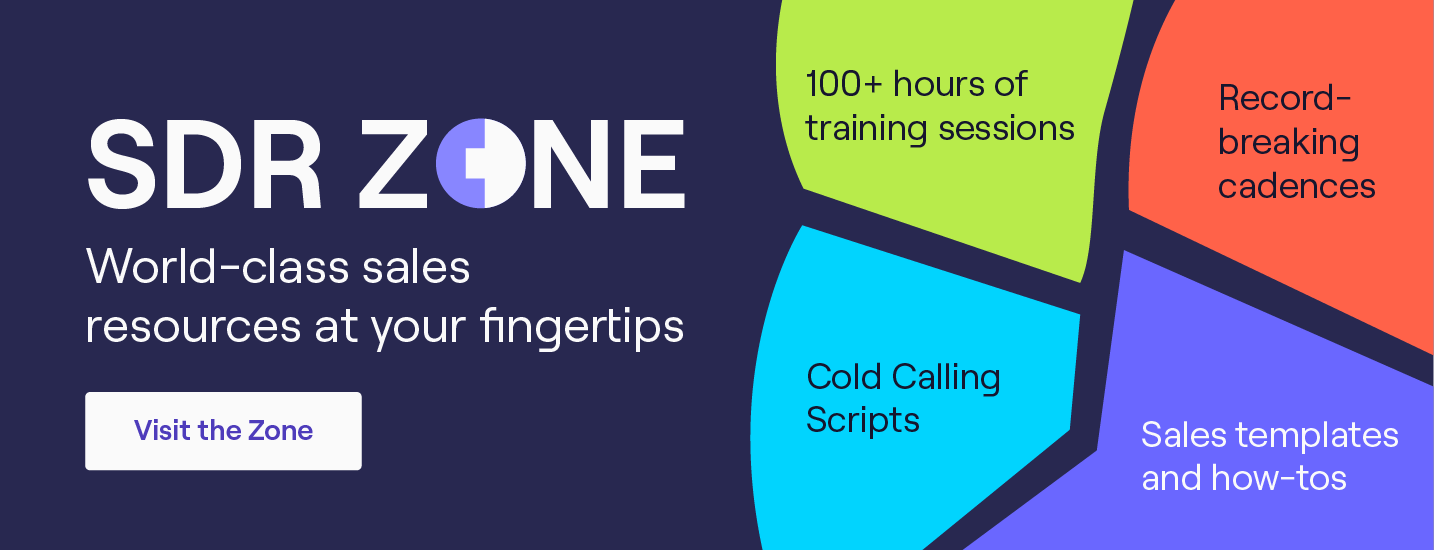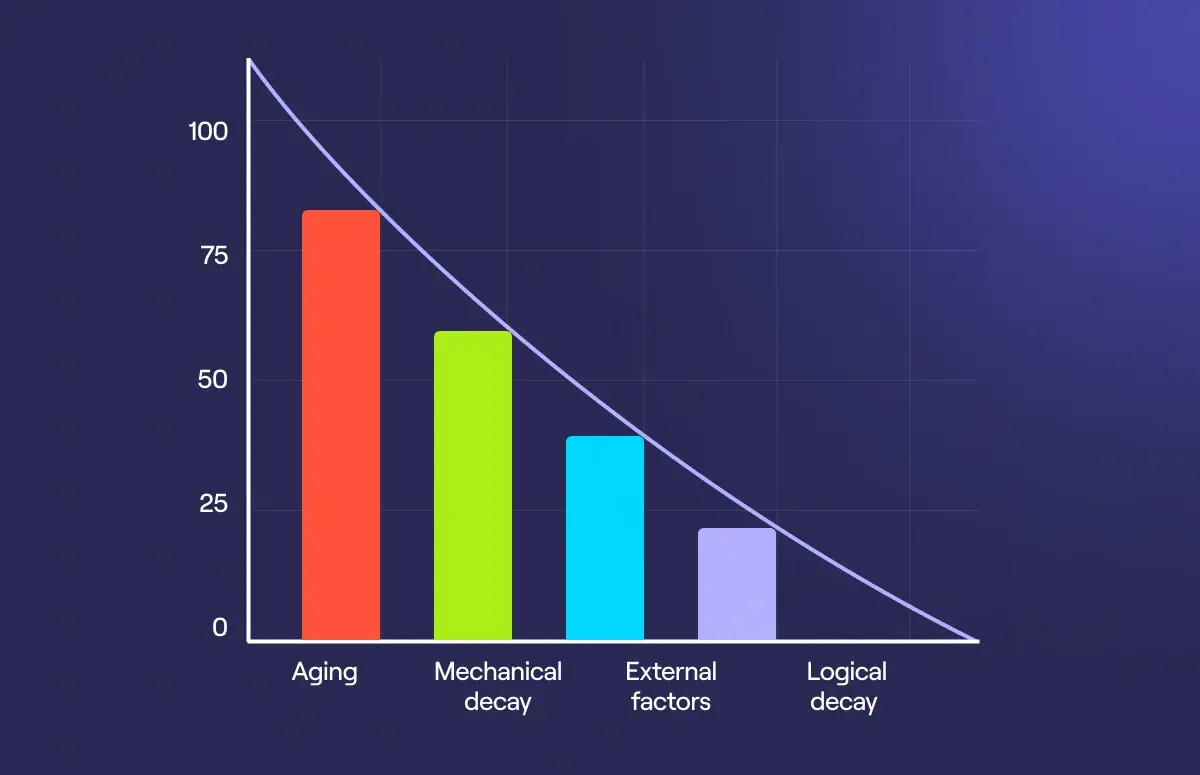What is Sales Development Representative's (SDR) Role?
Working in sales development has evolved massively in the last decade or two. Sales reps used to start on a traditional sales floor, picking up phones and talking to prospective clients.
The modern sales development representative (SDR) has become a strategic role. It now demands a diverse range of skills, knowledge, and a strong sense of teamwork.
Here at Cognism, we have the best SDR team, and we want to share all we know about their role in sales and marketing.
SDRs play a vital role in the lead generation process, identifying and qualifying potential customers. They also contribute to the marketing strategy by providing valuable insights from their interactions with prospects.
In this blog post, you’ll find expert quotes from industry leaders, informative videos that provide a visual understanding of the SDR role, and top tips from our experienced team. These resources cover the topic in depth, offering valuable insights and practical advice for aspiring SDRs.
Read on for the ultimate guide to SDRs, covering everything from their key skills to career credentials. Go! 👇
What is the SDR job description?
Sales development reps’ tasks revolve around expanding the company’s customer base. It’s usually an entry-level position in a sales department, so to start as a junior SDR, you don’t need a higher education degree. It’s good to have some experience in sales, though.
Here is a list of a typical SDR’s duties and responsibilities:
- Generate prospecting lists of decision-makers in target accounts using compliant and accurate contact data.
- Book outbound meetings through cold calls, emails, social outreach, and networking with potential customers.
- Follow up and engage with prospects (including C-suite/directors) who have enquired about the company’s product or service.
- Manage relationships with existing clients.
- Deliver relevant marketing content to prospects.
- Research your prospect’s coworkers to find other stakeholders.
- Follow up on existing contacts in your CRM to identify new sales leads.
- Use LinkedIn, CRM, sales enablement tools, and sales intelligence to improve processes.
What does a sales development representative do?
A sales development representative (SDR) is an employee whose job is to generate sales pipeline through prospecting.
So, if you’re an entry-level sales rep, your number one goal is to connect with potential prospects one-on-one. You can do this via sales efforts like cold calling or LinkedIn messaging.
One essential skill to master as a sales development representative is qualifying cold leads and deciding whether to move them through the sales funnel.
Your work will also involve gathering key sales data and conducting customer research. The best SDRs create sales opportunities, educate prospects about their solution, and make closing deals easier.
However, unlike AEs, SDRs don’t close deals. Their role is to find decision-makers at a company. How do they do this?
Well, here’s what a sales representative’s typical day looks like - based on our own sales team’s calendar:
- Responding to emails and LinkedIn messages.
- Confirming sales demos for Cognism’s AEs.
- Cold emailing/calling in 90-minute blocks.
- Sending Vidyards and LinkedIn voice notes to potential customers in 45-minute blocks.
- Setting up sales cadences and sending them to prospects.
- Completing admin tasks to prepare for the next morning.
Former Cognism SDR Katy Mason-Jones had this piece of advice for new sales reps:
“Break your day into 90-minute segments. That way, you won’t get distracted and you’ll finish what you need to complete.”
Watch the video below to learn more about the day in the life of a tech sales SDR 👇
What skills does an SDR need?
There’s no doubt that an SDR’s role is tough. But when you get it right, the role can generate feelings of satisfaction and accomplishment.
Let’s look at the SDR skillset needed to ensure a successful career in B2B sales.
1. Research
If you want to make a good impression on your prospective customers, do your homework! Check at least the prospect’s job title, industry, and location. Make sure the B2B data you have in hand is correct.
Want your prospects to be sold on your solution?
Research different buyers, market trends, and the competitive landscape. Personalise your pitch using sales triggers; this way, you’ll provide a seamless sales experience for your leads.
For example:
A company that just increased its headcount is surely experiencing some growing pains. Perhaps there’s an opportunity for your product or service to ease the burden?
2. Active listening
Active listening is one of the most important SDR skills. Why?
Because it lets you have human conversations with prospects! With active listening skills, you can position yourself as a consultant, not just a sales rep. It also means you don’t have to stick to a cold calling script.
This skill also helps you to better engage with prospects and judge whether they’re good fits for your company.
Former Cognism SDR Jennifer Gray told us how being an active listener helped her achieve her sales goals:
“Active listening saves you time in the long run. If you don’t pay attention to what your prospect tells you, you’ll reach the end of the call and realise that they were the wrong target for your product all along.”
3. Assertiveness
When Sam Gibbons started his job as an SDR at Cognism, it took him far too long to get to the point. Over time he learned that a sales development representative needs to be direct during an initial discovery call. You can always build a relationship with clients later.
Sam told us:
“As an SDR, you need to remember you’re interrupting somebody’s day. You’ll come across as more assertive and your clients will appreciate it if you get straight to the point.”
4. Creativity
The more creative your outreach, the more traction you’ll get. Sales is very competitive; you must look for ways to make your message stand out.
Aaron Ross is a Cognism board member and sales development expert. This is his top piece of advice for new SDRs:
“Immerse yourself in things that can help you learn and develop your skills and creativity. You need to be able to bring creativity and personality to whatever you do. You need to stand out from the barrage of other messages your prospects’ are getting.”
For example, different message formats, such as video prospecting, help you add more creativity to the process.
5. Curiosity
In addition to hard SDR skills, sales development reps must be curious.
Inquisitive sales reps convey that their primary aim isn’t just to close a deal, but to truly understand and address the challenges their prospects face. When you show curiosity and empathy, you make a successful sale more likely.
David Bentham, Cognism’s VP of Global Sales Development, said:
“Remember that as a sales development representative, you’re not only selling a product. In fact, you’re selling a solution to your prospect’s pain point.”
“Your job is to provide that solution by demonstrating you care about and understand what the prospect is going through.”
How can you succeed as a sales development rep?
David Bentham told us:
“An SDR’s effectiveness is the combination of sales pipeline generation and the win rate from those opportunities.”
In his opinion, this is how SDRs can maximise their win rates and close more qualified pipeline:
1. Book in job titles above the power line
Have a different strategy and mindset for above-the-power line users and below-the-power line users.
To do this, gather data from ICs or lower-level managers. Find out all you can about an organisation’s structure and who runs it. This will make your outreach more impactful when you engage with decision-makers.
The bottom line is, don’t just book meetings with average Joes just to fulfil your target. Source quality leads with decision-making power.
2. Provide a quality handover for your AE
Top SDRs drive the next steps (quickly), keep timelines as tight as possible and give their AEs a thorough level of context.
Here are some steps to follow:
- Schedule the meeting within 3 days of your initial conversation.
- Draw up an agenda for the meeting and present it to the prospect.
- Allow the prospect to add anything they want to see on the demo.
Whatever you learn through the process of booking the meeting, make sure you give this information to your AE.
David said:
“The prospect shouldn’t be asked the same questions twice. Your AE should be able to summarise your information and have enough context to probe and dig into the prospect’s challenges on a deeper level.”
3. Multi-thread in the early and later stages of the deal
David gave us this insight into Cognism’s sales process:
“We found our win rate improved by 32% when we engaged more than 5 stakeholders in a deal - so we incentivise our SDRs to multi-thread, early and often.”
This is our guide to multi-threading in sales:
- Start by talking to individual contributors (ICs) in the prospect’s business. Gather insights into how the business operates.
- Use whatever you learn from these conversations to inform your messaging across the wider buying group.
- Work in tandem with your AE to map out the entire buying committee and identify which stakeholders should be engaged next.
Looking for more? Read this blog for more tips on how to be a successful SDR.
SDR FAQs
How much does an SDR make?
An SDR’s salary isn’t clear-cut.
Sales development representative earnings vary depending on the results a person in this position delivers. Some companies decide to pay a base salary and add a performance bonus on top of that.
According to Comparably, the average sales development representative salary in the US is $74,764 a year of which $57,264 is a base salary.
But let’s review average salaries in the industry as reported by SDRs on job portals:
- Indeed reports a $76,520 base SDR salary + $10,900 commission per year.
- On Builtin, an SDR can earn $57,836 per year and get $24,634 in extra compensation.
- According to Payscale an SDR makes $48,682 base salary + between $5,000-$26,000 bonus per year.
As you might expect, the lowest salaries are for graduates and undergraduate students who enter sales without prior work experience. Whereas senior sales development reps can negotiate higher base salaries.
Is SDR a stressful job?
Yes, it certainly can be. The SDR role is results-based; if you don’t perform consistently and meet your targets, you can face problems.
This brings with it a pressure that very few other roles have.
Ryan Reisert, Head of Growth at NeonPixel, agreed:
“Sales is always on. It’s not a role where you can just clock in and clock out. There’s no end in sight - it’s a constant journey. There’s a constant loop of obstacles. And then the more success you have, the more it stacks up.”
Rachel Goldstone, Cognism’s Director of Sales Development, said:
“Within a sales environment, it’s very target-driven. Numbers don’t lie. So if your metrics aren’t there, it’s stressful.”
That’s not to say that no help is out there! If you’re struggling in the SDR role, check out Cognism’s tips for handling stress in sales.
What is the hardest part of being an SDR?
The hardest part of the SDR’s job is the amount of rejection they face day-to-day. According to Cognism’s State of Cold Calling Report, the average cold call success rate in 2024 is 4.82.
Our advice for performing well in sales is - don’t take it personally! Work on building strong mental resilience to overcome sales objections and the frustration of not connecting with prospects.
You can also make the job easier by leaning on your support networks, both inside and outside work.
Find out more about life in a modern sales team - press ▶️ to hear some SDR confessions!
How long is SDR training?
Opinion is divided on this subject!
Some B2B companies have lengthy training processes that last two weeks to four months.
But at Cognism, sales development representative training takes three days. Here’s what our training schedule looks like:
From the first day in the office, every new sales development rep is mentored by a senior SDR who knows the ropes and understands the pressure.
- Day 1: Starts with the basics like product knowledge and cold calling training.
- Day 2: Next, the new joiner listens to their mentor making calls and learns different processes and procedures.
- Day 3: Then, we get new SDRs on the phone! We don’t mind if they make mistakes at this stage, because it’s a vital part of gaining SDR experience.
The 72-hour SDR training wouldn’t be possible without a resource library that contains guides, webinars, podcasts, and more. And the best part is, we’ve made this library free to access - click 👇
Recently, Cognism also has been training our SDRs on the full sales cycle, including the AE perspective.
Why do we do this? David Bentham explained the process:
- SDRs are merited on opportunities that go into validation. The comp plan feeds into the incentive to bring in quality pipeline.
- It’s great for the SDR’s personal development, in terms of becoming an AE. Because they can understand the requirements of the role, in a practical, real-life setting.
- It creates strong alignment between the SDR and AE. They work together to engage all decision-makers in the buying committee.
- It removes the gap in SDR’s understanding of the sales cycle and the AE’s role within it.
- It gives SDRs a clear picture of what it takes to close a deal and how to be promoted to an AE.
David said:
“This method of SDR training is having an impact on pipeline and the continual self-development of our SDRs.”
What position comes after SDR?
Many passionate sales development reps who enter the industry quickly progress in their careers, usually to account executives and managerial roles.
The obvious next step in a junior sales development representative’s career is the role of an AE (Account Executive). What’s the first sign you’re ready for a promotion?
It’s when you can prove that you’re hitting your sales targets consistently.
When that happens, you might be asked to enter an SDR stand-in. This is when you stand in for an AE, taking over their role for a call or even a whole day. This process helps to assess your selling capability. It creates opportunities for exposure but, more importantly, is a proving ground.
If the experience goes well, you’ll be promoted to AE. If it doesn’t, that doesn’t mean your progress has ended. Make sure you learn from it and do better the second and the third time.
But a sales development representative’s career path isn’t always as straightforward as some may think.
There are exciting career path options available for SDRs, beyond AEs. They are:
- SDR Manager - trains, onboards new starters, and manages other SDRs.
- MDR Manager - qualifies MQLs and passes high-quality leads to sales.
- Community Manager - builds a consistent brand voice and personality and handles online communication.
- Customer Success Manager - helps new customers to achieve their sales goals and lowers churn.
- Content Manager - creates product or customer-related content and PR campaigns.
How do you get promoted from SDR?
Jason Baskaran, Enterprise AE at Contentful, gave us these tips for sales rep promotion:
1. Communicate
A sales manager has many skills, but mind-reading isn’t one of them!
If you’re a rep who wants a promotion, you must let your boss know!
The best approach?
Tell them:
“This is where I am now, and this is where I want to be tomorrow. Can we reach that conclusion together, or do I need to find it somewhere else?”
It’s then on your manager to tell you whether it’s possible.
2. Find a mentor
Before considering promotion, you’ll want to learn from people who’ve been there, done that and got the T-shirt.
So, Jason’s advice is:
“Find someone who has either done the AE role for a considerable amount of time and is really good at it. Or, find someone who is two steps above.”
“A mentor in a higher position will be able to give you even better learnings and even better information.”
3. Self-educate
Think about:
- How to not just meet, but beat, revenue targets.
- How to make a consistent, repeatable sales process for yourself.
- How you would learn from mistakes and commit to improving your performance.
- How you would bring something new to the role that no-one else has done before.
Jason said:
“Run those scenarios in your head. Tell them to watch sales demos from your top AEs and get practising.”
“This way, when you got the opportunity to stand in, you’re ready for it.”
4. Be sure
Remember, going from an SDR to an AE isn’t always the best next step for every salesperson.
You’ve got to be sure that this is what you really want.
For instance, it’s okay to go from an SDR to the marketing team. In fact, this has happened before at Cognism!
Take some time to think about it and ask yourself: “Do I want to be an AE?”
After working as an SDR, you’ll have picked up a whole host of skills that can be used anywhere in the business.
Need more career advice? Check out this blog from Kaspr on SDR career progression.
Is SDR a good career?
Yes, absolutely!
According to Ryan Reisert:
“Sales is a great option for people to get into. You don’t need an advanced degree. It’s very versatile.”
“You could veer off and instead of going into a closing role, you could go into leadership or team management.”
“Or you don’t have to stay in sales at all - it could open doors into marketing, product or customer success roles.”
Explore an SDR career with Cognism
Have we convinced you that working in a modern sales team can be a great start to a career?
We’re always on the lookout for people to join our sales organisation! Click the banner below to see our open roles.


![How To Find Someone’s Phone Number [7 Ways]](https://www.cognism.com/hubfs/V1-New-blog-graphics-Resource-card-1.png)

